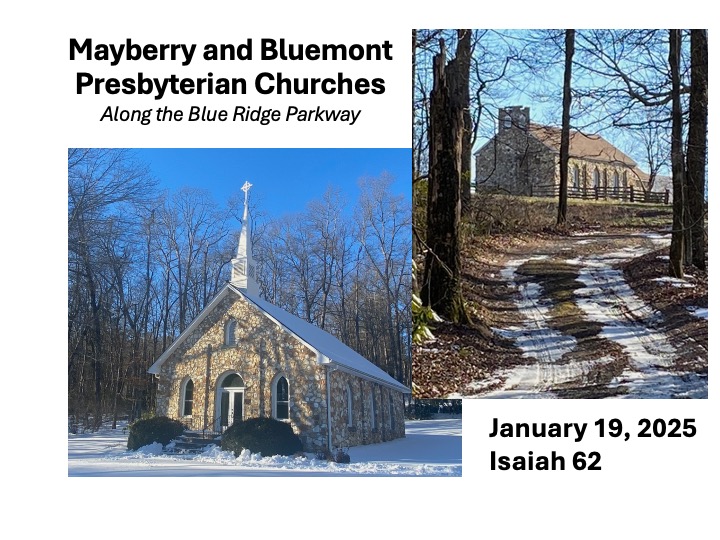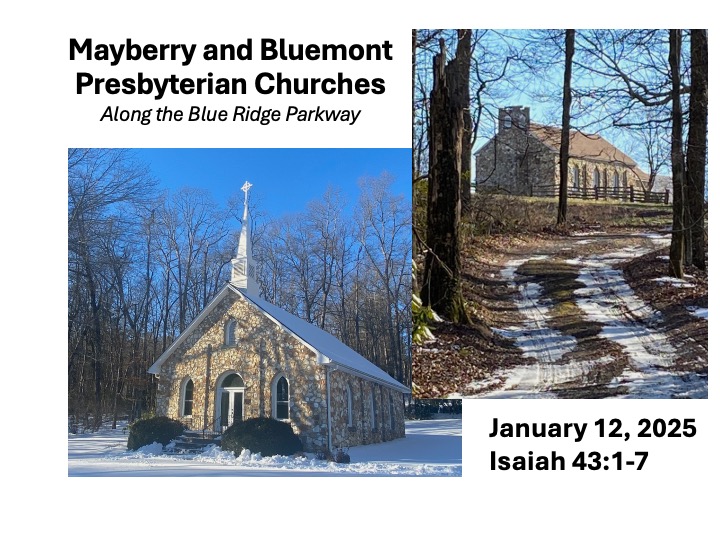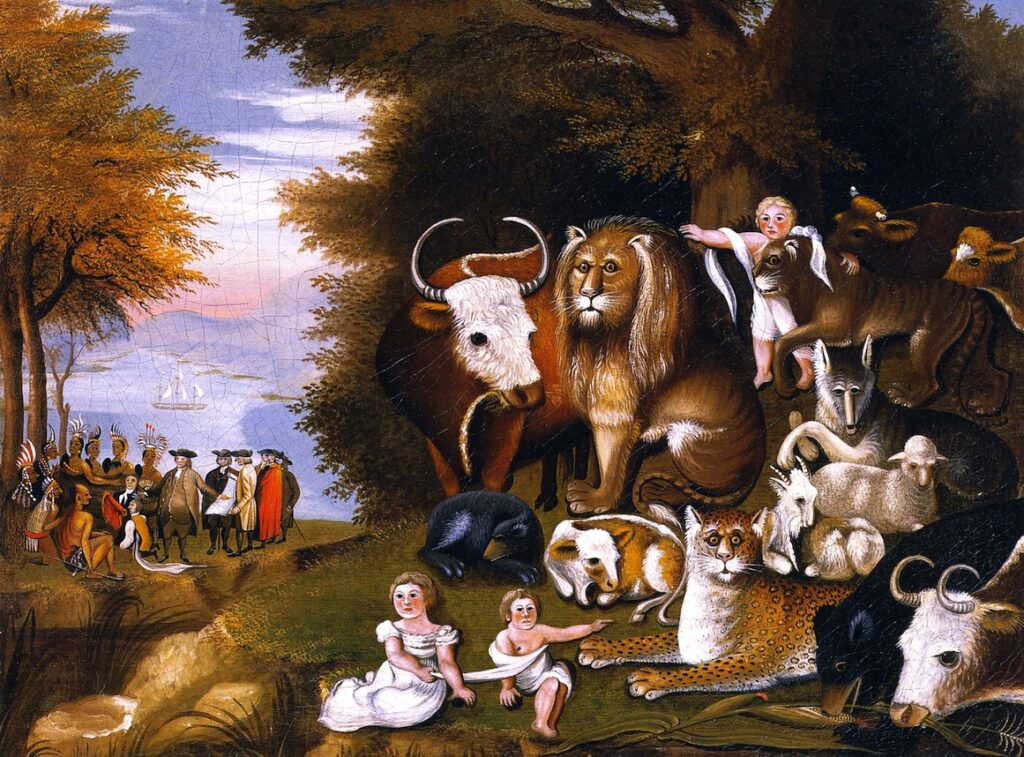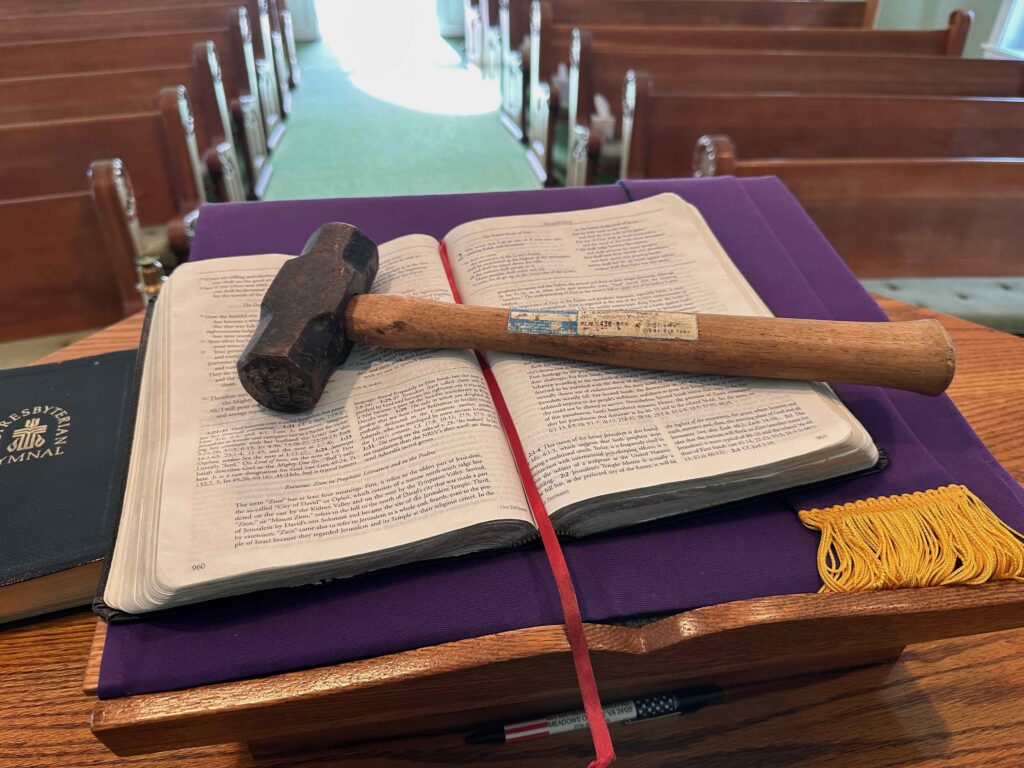Jeff Garrison
Mayberry & Bluemont Churches
February 9, 2025
Isaiah 6:1-13
Comments at the beginning of worship:
Two weeks ago, I used questions from the Heidelberg Catechism for our Profession of Faith. Some of you had trouble with the 4thquestion, which asks if you can live up to God’s law perfectly. The given answer is: “No, I have a natural tendency to hate God and my neighbor.” Several people questioned this, saying they don’t hate God or neighbor. Perhaps I should explain.
First, the catechism comes from the 16th Century. While it may be expressed in a different manner today, the hateful actions toward God or neighbor have nothing to do with how we feel about God or our neighbor. Since the 16th Century, we’ve gone through the romantic era which confused feelings and actions. When we causally say, “I love you,” we’re expressing a feeling. We truly express love (and hate) in action.
When we sin against God or another person, we show hate. We may not have hateful feelings, but we show contempt for them. Likewise, our love for God and neighbor needs to be more than some warm internal feeling. Instead, we show love by working for the wellbeing of the beloved. It’s become somewhat of a cliché, but love is a verb. I suggest the same goes for hate.
Essentially, what this question drives at is a deep understanding that we are sinners who first look out for ourselves. As Paul said, “All have sinned and fallen short of the glory of God.”[1] Because of this, confession is required. As I pointed out in my last sermon from Psalm 19, we should confess even to those sins we don’t realize we commit. Likewise, as we’re going to see in today’s sermon, we confess not just for individual sins we’ve committed, but those sins which come from the society in which we live and benefit.
I hope this clears things up. If not, let me know and I’ll be glad to discuss it further. Regardless of the fourth question, I commend the Heidelberg Catechism to you. It opens with the most beautiful question, “What is your only comfort in life and in death?” The answer begins: “That I am not my own, but belong, body and soul, in life and in death, to my faithful Savior, Jesus Christ.”[2] You can’t go wrong with such thinking.
Before reading the Scriptures:
As I’ve been doing since Christmas, I’m preaching on the Old Testament lectionary passages. Today, we’ll look at the sixth chapter of Isaiah. I have preached on this passage here once before, using it to discuss worship.[3] The flow of Reformed and Presbyterian worship follows this passage. We are called into God’s presence and sing God’s praises. God holiness reminds us of our need to confess our sin. So, we confess and find forgiveness which allows us to hear and respond to God’s call.
But this passage contains more insight than just worship, as we’ll see this morning. Not only is this Isaiah’s prophetic call, but we also learn about God and our relationship to the Almighty. And we’re reminded there are times before we can fully experience hope, consequences must be faced.
This passage can be broken up into parts. I’m breaking it into two parts: Isaiah’s encounter with God and the word Isaiah takes back to God’s people.[4] The lectionary doesn’t include the entire chapter, allowing the preacher to stop after Isaiah’s responds to God’s call with “Here I am, Lord, send me.”[5] But to cut this passage short, while it may make us feel better, keeps us from understanding it’s message.
Isaiah willingly volunteers to be God’s messenger. But he receives a tough message to take to the people. Unlike Jeremiah, who often shares his personal feelings with his readers, Isaiah keeps his cards close to the chest.[6] I wonder if, looking back, Isaiah questioned his willingness to volunteer? However, as the prophet understood, we’re to be faithful to God, which requires us to accept and struggle with the entirety of the Word. Doing so, we learn it’s not about us, but about God.
Read Isaiah 6:1-13:
It was the year Uzziah died. We often date things from significant transitions which include the death of important people. You know, the Hebrew people didn’t have a lot of great kings, but Uzziah was better than most.[7] At least he wasn’t totally rogue.
Death reminds us there can be no going back. History marches on. Sooner or later none of us will be here. Our time, like Uzziah, like Isaiah, will have passed. We should ask ourselves if we’re making the best of the time we’re given.
During this year after Uzziah’s death, Isaiah finds himself in the temple and receives a vision. God sits on the throne high above the temple. It requires only the hem of God’s robe to fill the temple. From this description, Isaiah reminds us that the real king, the King of Kings, overshadows whoever sits on David’s throne. The robe of God the King won’t even fit in the Salomon’s magnificent temple. All-around God, court is in session. Seraphs fly and sing while they shield their eyes from God’s brightness and their feet from God’s sight. Here, we’re reminded of an Old Testament notion that God goodness is such that if we, as sinful humans, looked at God, we’d die.[8] We also see an ancient custom, which in parts of the world still holds true, that the dirt on our feet represents the unclean state of creatures.[9]
Isaiah is beside himself. Feeling doomed, he cries, “Woe is me; I am a man of unclean lips and live among people of unclean lips, yet my eyes have seen the King, the Lord of hosts!” The idea of unclean lips implies the uncleanness of the whole person as Jesus says in Matthew, “What comes out of the mouth proceeds from the heart, and that is what defiles.”[10] Furthermore, we learn that Isaiah doesn’t just see himself as sinful, he also understands he lives with sinful people. This passage is why, in our prayer of confessions, we have time for corporate and individual prayer. We are responsible for the bad things we do individually, as well as the bad things done by society at large.
Only after the coals from the altar touch Isaiah’s lips does he hear God’s call. Now, instead of fear, he confidently volunteers to be God’s spokesperson. As I suggested earlier, we don’t know what he thought of the message he must carry to the people, but he’s got a job to do.
Verses 9 to 12 is a message of doom. God’s word brings confusion and a hardening of heart and leads to destruction. Often, we hear of God saving a remnant, but here we’re told if only 10% survives, it, too, will be destroyed. Total destruction. Everything is empty.
When I lived in Utah, about once-a-year Ralph, a friend of mine, and I would take a trip out into the desert to explore. One year we set our sights on Hamilton and Treasure City, true ghost towns located in White Pine County, miles from a paved road. In the late 1860s, 12,000 people lived around the Treasure Hill mining district, but the gold and silver didn’t run deep. Two years later, the towns declined. By the mid-1870s, they were abandoned.[11]
That night we camped on Main Street in Treasure City. It was eerie. Half stone walls of former buildings surrounded us and created long shadows as the sun sank in the west. Nothing remained intact. And you had to be careful walking around because there were open mining shafts in which you could fall. No one else was around. In the distance, coyotes sang. At nearly 10,000 feet, the brilliant stars looked to be just out of our reach. The wind rustled sagebrush, and a few dangling pieces of roofing tin squeaked.
Reading Isaiah’s message, I imagine Jerusalem looking like what Treasure City did back in the mid-1990s when we camped there. Of course, Treasure City’s destruction had nothing to do with God’s judgment. There was just a limit of the available high-grade ore. But the result was the same. Both Jerusalem and Treasure City became desolate.
But why would God do this? Why wipe out even the remnant? I don’t claim to understand all of God’s ways, for I am not God. But I think we learn two things here. First, the chapter ends with only a lifeless stump remaining. Five chapters later in Isaiah, we read about a shoot coming from the stump of Jesse (David’s father).[12] From that stump comes hope. And by bringing life from the stump, God demonstrates his power not only to create but to redeem a fallen creation.
Second, the eventual fall of Israel, Judah, and Jerusalem changed the Hebrew people.[13] After the exile in Babylon, you no longer hear of God’s people following pagan gods. Instead, the Jews who returned from Babylon to rebuild remain, to this day, solely committed to One God, the Creator of Heaven and Earth, the God of Abraham, Issac, and Jacob.And for us Christians, this God is the Father of our Lord Jesus Christ. Our ultimate trust doesn’t belong to any human construct or person, but only to Almighty God, who has the power to redeem. Sooner or later all we have and create will fail. But God, and those whom God claims, will remain. Amen.
[1] Romans 3:23.
[2] To review the catechism in its entirety, see https://www.crcna.org/welcome/beliefs/confessions/heidelberg-catechism
[3] See https://fromarockyhillside.com/2022/04/03/why-church-for-proper-worship/ For others who see this passage as an outline for worship, see Walter Brueggeman, Westminster Bible Companion: Isaiah 1-39 (Louisville: WJKP, 1998), 58 and Scott Hoezee, “Isaiah 6:1-8 (9-13) Commentary, https://cepreaching.org/commentary/2022-01-31/isaiah-61-8-9-13/
[4] Some scholars break this passage into 3 parts (the vision of the King, the purification, the commissioning). See Otto Kaiser, Isaiah 1-12, John Bowden translator, (Philadelphia: Westminster, 1983), 123-133.
[5] While this passage shows up several times in the three-year lectionary, at least this week’s lectionary adds verses 9-13 in brackets, suggesting they’re optional.
[6] Christopher R. Sietz, Isaiah 1-39: Interpretation, A Bible Commentary for Teaching and Preaching (Louisville: John Knox Press, 1993), 57.
[7] 2 Kings 15:3. 2 Chronicles 26 gives a more complete picture of his reign and how he sought out God when his reign began (at the age of 16). Later in his long reign, pride got the best of him as he invaded the priest domain in the temple.
[8] See Exodus 19:21-22, 20:18-19.
[9] In the Muslim world, it is considered an offense to sit on the floor with your feet facing others. You’re to bend your legs so your feet are behind you.
[10] Matthew 15:18
[11] For insight into Treasure City, see Shawn Hall, Romancing Nevada’s Past: Ghost Towns and Historical Sites of Eureka, Lander, and White Pine Counties (Reno: University of Nevada Press, 1994), 199-202.
[12] Isaiah 11:1. This passage titled “The Peaceful Kingdom,” is often read during Christmas.
[13] Isaiah writings here would have been in the time of the Assyrians, who destroyed Israel (the Northern Kingdom). Jerusalem wouldn’t be destroyed and desolate until their defeat by the Babylonians.













